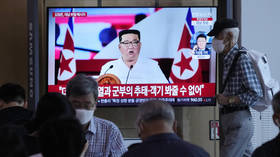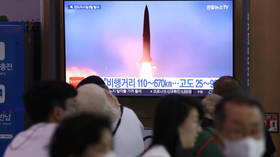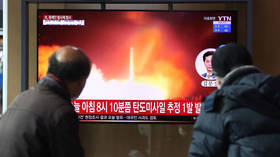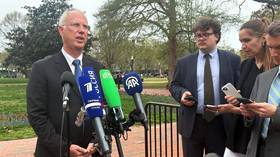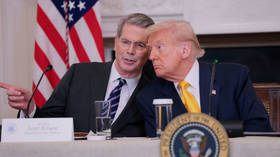Biden’s inaction has ensured North Korea’s nuclearization
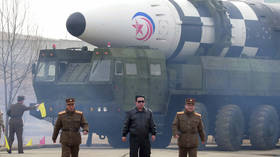
North Korean leader Kim Jong-un recently signed a law that codified that nation’s nuclear weapons program, slamming shut the door to the possibility of denuclearization that had, during the administration of former US President Donald Trump, been tantalizingly held open.
While South Korean officials have indicated that they had anticipated this step, the fact is that Pyongyang’s move has fundamentally altered the strategic reality in the Pacific. Any potential conflict with North Korea now brings with it the near certainty of nuclear weapons being used against South Korea, Japan, and the United States, prompting threats from the South Korean Ministry of Defense that any such move by its northern neighbor would be little more than a “walk into a path to self-destruction.”
While there is no doubt that any use of Noth Korean nuclear weapons would precipitate a devastating response from the United States, American nuclear revenge would provide little solace to the tens of millions of South Koreans, Japanese, and American citizens whose lives could (and likely would) be terminated as a result.
The citizens of South Korea, Japan and the United States need to reflect on this new reality and ask themselves how it came to be. In the end, the blame rests with current US President Joe Biden and his administration.
When Biden’s predecessor, Donald Trump, came to office, he was confronted with a series of US policy realities more stagnant than dynamic. These included, among others, the status of NATO, the implementation of the Iran nuclear deal, US-Russia arms control, the ongoing US military presence in Afghanistan, and the issue of North Korea’s nuclear weapons.
Trump fumbled on some of these issues; his decision to withdraw from both the Iran nuclear agreement and the Intermediate Nuclear Forces (INF) treaty stand out. Other policy initiatives, such as demanding that NATO members pay their fair share of the cost of collective defense and beginning the process of withdrawing from Afghanistan, were deemed highly controversial by the US establishment.
So, too, was Donald Trump’s bold initiative to engage directly with North Korean leader Kim Jong-un on the issue of denuclearization. While Trump ended up softening his stance on NATO and held off on ordering a withdrawal from Afghanistan until the end of his presidency, the North Korean initiative was acted on decisively from the very beginning of Trump’s time in office.
Early in his tenure, Donald Trump threatened North Korea with “fire and fury” if it were to threaten the United States with a nuclear-armed missile, and mocked Kim as “Little Rocket Man.” But the Winter Olympics, hosted by South Korea, opened the door for more positive interaction between North Korea, South Korea, and the United States. In April 2018, Trump dispatched then-CIA Director Mike Pompeo on a secret visit to North Korea, the purpose of which was to set up a summit between Trump and Kim.
Immediately after Pompeo’s visit, Kim announced the closure of the country’s nuclear test site and the halting of long-range ballistic missile tests in a clear signal that his government was serious about discussing the denuclearization of the Korean Peninsula. This goodwill measure helped pave the way for a June summit in Singapore between Trump and Kim, after which Trump optimistically tweeted that “there is no longer a Nuclear Threat from North Korea,” which Trump claimed was no longer America’s “biggest and most dangerous problem,” as it was under President Obama. “Sleep well tonight!” Trump told the American people.
The success of the Singapore summit led to a follow-on meeting in Hanoi, Vietnam in February 2018. It was expected that Trump and Kim would sign a deal partially lifting sanctions on North Korea in exchange for the complete dismantlement of the massive Yongbyon nuclear facility. While North Korea was prepared to enter into an agreement that provided for a step-by-step approach to its complete nuclear disarmament, Trump’s closest advisers insisted on it committing to complete disarmament, only after which sanctions would be lifted. The Hanoi summit ended with no deal and left North Korea feeling betrayed by the Trump administration.
In June 2019 Trump made one last desperate push to jump-start denuclearization talks with North Korea, meeting with Kim along the DMZ separating North and South Korea, and stepping across the demarcation line, becoming the first sitting US president to enter North Korea. But Trump’s political courage was not matched by his administration, with hardliners like National Security Advisor John Bolton and Secretary of State Mike Pompeo undermining any chance of an agreement being reached by insisting on hardline policy positions they knew to be unacceptable to North Korea. Trump finished his term with the potential of denuclearization unfulfilled.
But not dead.
The North Korean leadership kept the door open for the possibility of continued negotiations, initially adhering to its commitment not to test nuclear weapons or intercontinental ballistic missiles. But more than a year and a half into the administration of President Joe Biden, the US has made no meaningful effort to reengage with Kim. This neglect paved the way for his decision to permanently close the door to denuclearization talks and certify North Korea’s nuclear arsenal as an integral and permanent part of its arsenal, one which could be employed pre-emptively if it were to ascertain a direct threat to its existence.
Trump may have been getting ahead of himself when he said Americans, Japanese, and South Koreans could “sleep well,” but it’s Biden and his administration who have made sure they can’t.
The statements, views and opinions expressed in this column are solely those of the author and do not necessarily represent those of RT.

